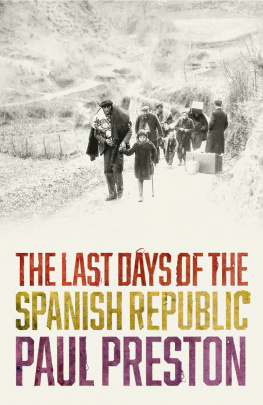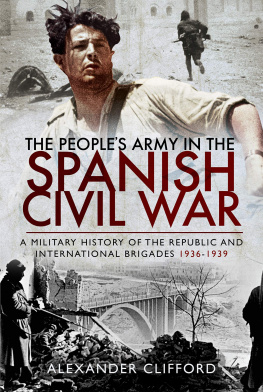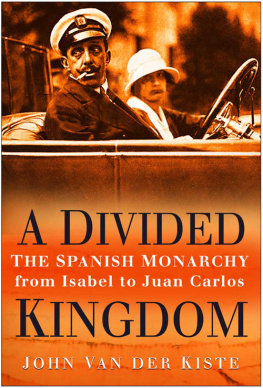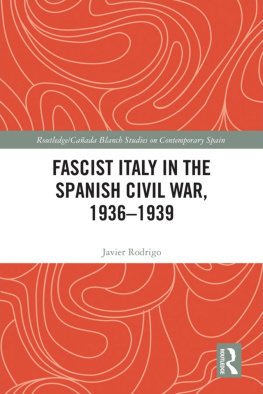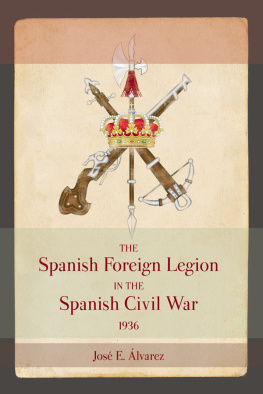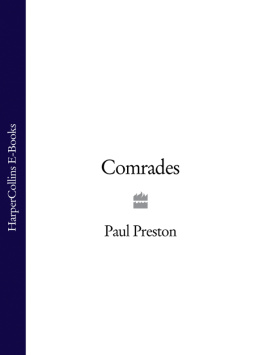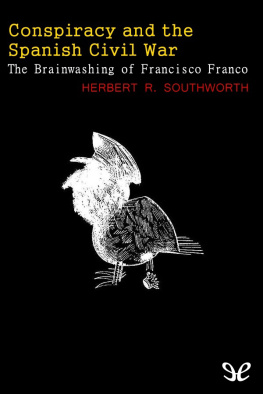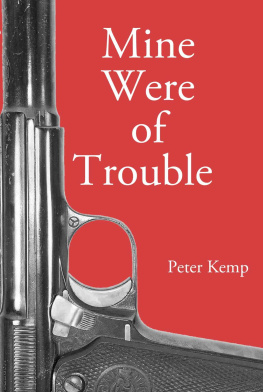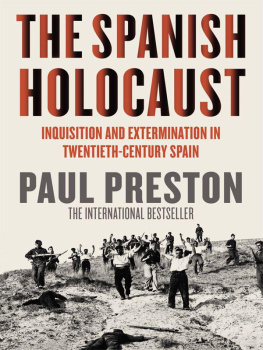In the course of preparing this book, I have had the good fortune to rely on the advice on various issues of the following friends and colleagues. Michael Alpert, Javier Cervera, Robert Coale, Alfonso Domingo, Luis Espaol Bouch, Xulio Garca Bilbao, Carmen Gonzalez Martinez, Fernando Hernndez Snchez, Eladi Mainar Cabanas, Ricardo Miralles, Enrique Moradiellos, scar Rodrguez Barreiro, Cristina Rodrguez Gutirrez, Sandra Souto and Julin Vadillo.
I am extremely grateful to the following friends for their help in the location of archival material. Laura Daz Herrera for her invaluable help in Madrid and vila; ngeles Egido Len, Jos Manuel Vidal Zapater and Luis Vidal Zapater for permitting access to the unpublished memoirs of Jos Manuel Vidal Zapater; Mara Jess Gonzlez Hernndez for help with the Causa General. Aurelio Martn Njera as so often in the past was immensely generous in helping me with documents held in the Archivo Histrico of the Fundacin Pablo Iglesias. Sir George Young and Lady Young kindly granted permission for the use of the papers of Sir George Young. My greatest debt is to Carmen Negrn and Sergio Millares Cantero for their unstinting assistance with both the papers and the photographs held in the Fundacin Juan Negrn of Las Palmas.
I also want to put on record my thanks to Jess Navarro, Juan Carlos Escandell and Jos Ramn Valero Escandell for an unforgettable day spent exploring Posicin Yuste (El Poblet), the houses at Posicin Dakar and the airfield (now a vineyard) of El Fond in Monver. Professor Valero Escandell also generously provided maps and photographs of the area of the Val de Vinalop.
The gestation of this book, as with others in the past, was made especially rewarding thanks to my good fortune in being able to discuss many points of fact and of interpretation with my friends Helen Graham, Linda Palfreeman and ngel Vias.
1
This is the story of an avoidable humanitarian tragedy that cost many thousands of lives and ruined tens of thousands more. It has many protagonists but centres on three individuals. One, Dr Juan Negrn, the victim of what might be termed a conspiracy of dunces, tried to prevent it. Two bore responsibility for what transpired. One of those, Julin Besteiro, behaved with culpable naivety. The other, Segismundo Casado, behaved with a remarkable combination of cynicism, arrogance and selfishness.
On 5 March 1939, the eternally malcontent Colonel Casado, since May the previous year commander of the Republican Army of the Centre, launched a military coup against the government of Juan Negrn. Ironically, he thereby ensured that the end of the Spanish Civil War was almost identical to its beginning. As General Emilio Mola, the organizer of the military coup of 1936, its future leader General Francisco Franco and the other conspirators had done, Casado led a part of the Republican Army in revolt against the Republican government. He claimed, as they had done, and equally without foundation, that Negrns government was the puppet of the Spanish Communist Party (Partido Comunista de Espaa, or PCE) and that a coup was imminent to establish a Communist dictatorship. The same accusation was made by the anarchist Jos Garca Pradas, who talked of Negrn personally leading a Communist coup. In that regard, it is worth recalling the judgement of the great American war correspondent Herbert Matthews, who knew Negrn well:
Negrn was neither a Communist nor a revolutionary I do not believe that Negrn gave the idea of a social revolution any thought before the Civil War Negrn retained all his life a certain indifference and blindness to social issues. Paradoxically, this put him in agreement with the Communists in the Civil War. He was equally blind in an ideological sense. He was a prewar Socialist in name only. Russia was the only nation that helped Republican Spain; the Spanish Communists were among the best and most disciplined soldiers; the International Brigade, with its Communist leadership, was invaluable. Therefore, Premier Negrn worked with the Russians, but never succumbed to or took orders from them.
A not unsimilar view was expressed by Negrns lifelong friend Dr Marcelina Pascua:
Was Negrn a Communist? How ridiculous! Not by a thousand miles. He was congenitally individualistic, utterly disinclined to follow a collective discipline or to put up with tight rules and regulations imposed by a political party or to follow the personal requirements that the instruments of marxism impose on their adherents. As far as any hero worship was concerned, the person that he admired most was Clemenceau (and not his contemporary Lenin) despite being fully aware of his repressive and reactionary policies against the trade unions and his persistent hostility to the French Socialists. I always interpreted Negrns veneration for the Tiger in terms of his being seduced by the energy and efficacy that he demonstrated during the First World War. This explains the contradiction because what Negrn admired in Clemenceau was exactly the pragmatic determination to win the war that was what he aspired to do in the Spanish conflict.
According to Pascua, Negrn adopted as a private slogan Clemenceaus remark that Dans la guerre comme dans la paix le dernier mot est ceux que ne se rendent jamais.
Casado claimed that he launched his coup because he was sure that he could put a stop to what was increasingly senseless slaughter and that he could secure the clemency of Franco for all but the Communists. Even if this was genuinely his selfless motive, and there is ample evidence to the contrary, he went about it in the worst way imaginable. In his dealings with Franco, he behaved as if he had nothing to bargain with. He seemed to be oblivious of the fact that Franco was obsessed with capturing Madrid, the very symbol of resistance. The Caudillo had failed to do so in November 1936 and had also been thwarted at the battles of Jarama and Brunete in February and July 1937. Unlike Negrn, who could threaten continued resistance when Franco was being pushed by his German and Italian allies for an early end to the war, Casado took the position that the war was already lost. His only hope therefore was the naive, and rather arrogant, belief that Franco would be susceptible to a vague rhetoric of shared patriotism and the fraternal spirit of the wider military family, as if somehow they were equals. In consequence, his action would actually cause massive loss of life.
It is certainly the case that the defeat of the Spanish Republic was already in sight. What remained possible, however, was to ensure that the war ended in such a way as to secure the evacuation of the most at-risk politicians and soldiers and guarantees for the civilian population to be left behind. As Negrn had commented to Juan-Simen Vidarte of the executive committee of the Spanish Socialist Party (Partido Socialista Obrero Espaol, or PSOE): A negotiated peace, always; unconditional surrender to let them shoot half a million Spaniards, never.

